- Home
- Laura Anne Gilman
Staying Dead Page 20
Staying Dead Read online
Page 20
He nodded. “Stay low,” he repeated. “And I’ll see you around.”
Wren forced a smile, and walked out the door. “Idiot! Idiot, idiot masquerading as a target!” But by the time she’d walked the three blocks back to her apartment, she was almost resigned to the entire situation.
Maybe the Council does have their fingers in the Frants job, despite what Sergei said. It’s also entirely possible that this Council brew-up has nothing whatsoever to do with the case. The Eastern branch has been on our backs for decades; hell, long before I was born.
By the time she had climbed the five flights, the endless loops her thoughts were taking her in had turned her resignation into amusement. “Wren Valere, scourge of New York City,” she said out loud. “The woman strong Talents fear to gossip with.”
Talk to Sergei, she decided. He probably wouldn’t have a clue what to do about it, either, but then again, maybe he would. He’d gone nose to nose with the Council, after all, twice now. Maybe he had some insight a lonejack would be too close to see.
And maybe he’ll know a nice city somewhere we can relocate to, when—if—the storm actually breaks. She left her bag on the kitchen counter, checked to see if there were any messages—there weren’t—and went into the music room to put on some careful thinking music.
“Hey. Hey!”
Wren had just been starting to bliss out to the sounds of Rick Braun’s “Night Walk” when she heard the banging on the window. One eye had opened, then closed again, but the noise didn’t stop. Heaving a sigh, she picked herself up off the floor and went into the kitchen.
“I’m going to get you your own key,” she grumbled, letting P.B. in through the window. The pleasure she felt in his casual manner—so different from the humans of the Cosa today—made her tone less irritable than usual.
“Really?”
“Not a chance in hell.”
P.B. sniffed the air. “Oh yum. Any leftovers?”
She gestured to the fridge. “Mi casa es su casa, apparently. Claws off the orange beef, that’s breakfast tomorrow.”
“That’s disgusting.”
“Excuse me? You eat carrion by nature, P.B. Or have you forgotten that little detail?”
“Hey, nobody asked me when they designed my ancestors.”
Literally. Demons were the only members of the Cosa to have documented origins. Sometime back in the eleventh century, according to the journals of one H. Buchanon, sick but Talented bastard. Wren had wondered once what sort of creatures he had used as the base stock for his creations. The probable answers so disturbed her she swore never to think in that direction ever again.
“Did you have a reason for showing up, or were you just looking for someone’s day to ruin?”
He stopped with his paw inside the carton of pork fried rice. “Whoa, someone got up on the wrong side of the smiley face this morning.”
Wren sighed. “Right, sorry. It’s been a long week, a long damned day, and I had a headache to begin with.”
“Oh, sorry.” He shuffled back a step or two, and she smiled at him. That small a distance didn’t really make much of a difference to the vibes his kind put out, but it was sweet of him to try.
“And yeah, had a reason. Was at the Firehouse last night, got some good gossip. If you’re not too cranky to indulge…”
After the brush-offs she had been getting from her human counterparts, Wren almost pounced on this indication of normalcy. “Sit. Spill.”
He chuffed laughter, and Wren had a vaguely unsettling view of his teeth before the black-lined lips closed again. “You may not be so happy to hear what I’ve got to say when it’s said.”
“That would sort of fit with the rest of the day, that I finally get gossip and it comes with a warning label. Never mind, go on, tell me anyway.”
“There’s talk about maybe this vigilante group is being funded by the Council.”
Wren boosted herself up onto the kitchen counter and stared at the demon. “Use a fork,” she suggested absently. “Otherwise you’ll get spices under your claws and that’s going to burn. Why would they do that? Okay, so the Council isn’t exactly fatae-friendly, but they’ve always been Cosa. Always.”
“Except when they’re trying to shut us down, put their rules on us. Hell, you’re a lonejack, you know what it’s like.”
Wren snorted at the timeliness of that comment. Everyone had a mad-on for the Council this week. Not that this was anything new. The Mage Council had been founded to keep a check on human magic-users. The first lonejacks had told them where they could stuff those checks. It had been pretty much subdued oneupmanship ever since then, seven generations of sibling rivalry, with the Council always but always having the upper hand.
“They’ve always claimed dominance over us, yeah.” None of P.B.’s business what was going on within the lonejack community, if he hadn’t sniffed it out already. “But I don’t get the logic of this. Even if they wanted to—okay, assume they want to, even if they thought they could somehow control all of the fatae, why would they fund a bunch of bigoted head-knockers as part of their plan?” She shook her head. “I don’t buy it. Maybe a mage or two—hell, maybe even a lonejack or two, we’re not all comfortable with the more, hrmm, outré of the fatae, but not as a Council-condoned movement, no.”
“They’re human. We’re not. You really think that doesn’t matter to the Council?”
She rolled her eyes at him, as theatrically as she could manage. “Sheesh, and people say we’re a bunch of bigots!”
“What, you thought that was only human nature?” He shook his head, sharp-pointed ears twitching, something she didn’t remember ever seeing before. He must really be nervous. “Face it, Valere, there’s going to come the day when the Council goes too far. When they show their colors, put off the mask, whatever cliché you want to use. Where are the lonejacks going to stand then, huh?”
Oh God, I’m being felt out for a rebellion! The thought came and went in an instant, as did the quick Do they know the lonejack gossip, that I’m going to be the Council’s whipping boy? Girl? Whatever?
“You’re assuming a group consensus. Unlikely, with us. Even if you’re talking about just the East Coasters.” She was not going to get caught up in this. Not with her own problems already breathing fire.
“I’m serious.” Beady black eyes stared into her own and she was reminded in their red-flecked depths that P.B.—cute fur and button nose aside—was called a demon for a reason. “What’s it going to be? Human to human? Or the side you know is right?”
Time to shut this discussion down. Hard. “When the time comes, I’ll choose. Why are you in such a rush to have that moment arrive? Do you want to see the Cosa broken?”
“I’m not rushing anything. Just telling you what I see.”
“I got eyes, too, P.B.”
“Right.” He looked down, seemingly astonished to see that he had eaten his way to the bottom of the container. “You got eyes, but they’re human ones. Guess it makes a difference.” He put the container in the trash, gently, and turned to look at her. “See ya around, Wren.”
“Damn it, P.B….”
“No, I mean it. I’ll see you around. You’re okay. For a human.” He shrugged. “Everything else…we’ll see, right?”
“Yeah,” she said, watching him climb out onto the fire escape and slip down the ladder. “Yeah, we will.” Those whom the gods wish to destroy, they first set among factions. “I need more aspirin.”
The sky was splashed with pinpoints of stars, untouched by moonlight. The softness of warm air, and the sigh of leaves bent by the night breeze. A house behind him, lit from inside by bright white lights. Nothing felt real, or right. This wasn’t where he had been. This wasn’t right. He was…who was he? What was he doing here?
A tremor of panic wrapped around his brain, and he forced it away, forced himself to think clearly. He stood in the middle of the wide, sloping lawn, his back to the house, and stared into the night, oblivious to the pack o
f hellhounds circling him several feet away, uncertain whether to strike or not.
Where was he? What had happened? He looked at his hands, fingers open, palms facing upward, then brought his left hand slowly up to touch his mouth, his jaw. They made contact, then flinched away in discovery.
He had been a handsome man, before. It was a justifiable vanity which had made him take such care when getting dressed in the morning. Now, his cheekbone felt soft, giving way under his touch, and his pale blond hair was matted and caked with gore on one side, and dusted with cement dust all over. His worsted wool trousers were badly rumpled, and a rip in the knee distracted him for a moment, for he certainly would have recalled tearing his clothes! His hat was gone, his favorite hat, which he knew he’d had with him when he left…this morning? was gone, and he felt a moment’s worry about that—his head uncovered, like some young boy at play! His waistcoat was covered with that same gray dust as his hair, and there was another tear in the left sleeve of his shirt. That arm was clearly broken, hanging at a horribly awkward angle. But he felt no pain, wasn’t even aware there was anything wrong until touch and sight informed him of it.
He blinked, tried to organize his thoughts, tried to recall his last memory before waking here.
Nothing. Only the cold waiting space of eternity, a hollow pain that ate everything else. Think, damn it! Dust. Cement. You were on a site, looking over a project. Karl had been behind you, holding your briefcase while you checked on the marble slabs to be set into the foundation. Something had been wrong with them, one had been damaged…. And then the memory rose as though out from deep lake water, to reclaim the air—save no air filled his lungs or formed his exhale. No breath…
And it came back to him, a sudden screaming howling rush that overran his brain, knocked down walls and took up residence like a flight of harpies. Logic fled. Dark blue eyes unfocused, then sharpened again in madness. Where he was no longer mattered. What he had been no longer mattered. Memories consumed him, and pain, and the only thing which concerned him was getting back to where he had been. And killing the man who had killed him.
His battered, staved-in face was further torn by a feral snarl that had the hounds stepping back carefully, so as not to catch his attention. He strode forward, his feet planted firmly on the earth in the ground-covering stride of a man with a destination. But the well-manicured blades of grass poked through the dusty brown leather of his shoes, through the pale skin and bone. Not like physical objects might pass through a hologram, but as though two solid objects somehow shared space with each other, two universes meshing imperfectly.
Left behind, one of the hounds whined, a low, worried, confused sound. Then, as one, the pack turned and fled in the opposite direction.
The ghost walked faster, ignoring the trees around him, the wildlife that fled from him, his death-crazed brain throwing image on top of image, memories colliding with nightmares. The feel of paper beneath his fingers, of fine wood and cool glass, rough-hewed stone and polished marble. The sharpness of a knife at his throat, the putridity of smoke and burning flesh. The touch of skin to skin, the sound of laughter low in the throat and whispers and shouts of joy. The sensation of falling, of landing. The satisfaction of completion interrupted by pain. Laughter, low-voiced laughter as he lay in his own blood, as they poured darkness on top of him, heavy darkness, and left him screaming until he smothered beneath his own voice…
Not heaven, not hell, not even the endless turning of some judgmental wheel—forever held suspended within his tomb, the energy of his death sustaining the spell until the structure it was tied to—His structure! His creation!—crumbled and fell.
But he was out, now. Free of that damned crypt, if not of this world. But that was all right. That was better than all right.
He stopped, something inside him orienting itself, and then he nodded sharply, and changed direction, this time heading south. He knew what had happened. He knew where to go.
fifteen
They were waiting in his apartment when he came home from the gallery that night. Two of them, high-rent suits and subdued silk ties, shoes polished and haircuts perfect. A chorus of Warren Zevon’s “Werewolves of London” went through Sergei’s brain before he ruthlessly clamped down on it. Now was no time for whimsy.
Their timing was, to put it bluntly, horrible. And it didn’t help to acknowledge that he had brought it down on himself; going to Douglas had started a chain of inevitability, this visitation the logical progression from the phone call the night before. Client, Council, Vigilantes, Silence. Disparate threads; somehow becoming a web. A large, nasty, sticky, mostly still unseen web.
The problem was, it had been a long day on top of damn little sleep, and waking up in Wren’s desk chair, which had been adjusted for someone a full foot shorter than he was, hadn’t helped his mood any. He was in no shape to deal with a confrontation. Not now. Not today. Not yet.
But they weren’t giving him any choice.
“So much for locks. Or common courtesy.” Sergei kept his voice dry, ironic. Professional. He locked the rage, the fear deep down inside, put on his very best mask and closed the apartment door behind him. I’m going to get an ulcer.
“We waited outside for an hour. I think your doorman was about to call the police. So we decided discretion was the better part of not being arrested.” The older of the two, the familiar face, had made himself at home on the long brown leather sofa. The other, standing behind him like a soldier at parade rest, was an unknown. Insurance, Sergei decided. Not muscle—the Silence wasn’t that foolhardy, to force the matter like that. But a guarantee that whatever happened it would be two to one. A compliment, if you took stock in things like that. He was disgusted to discover that he still did.
“And leaving a note to say you’d stopped by never crossed your mind,” he murmured, shrugging out of his coat and hanging it in the closet. Dusk had already settled, and he touched the control pad that turned on a scattering of lamps throughout the space. His apartment was an open space; no alcoves or half walls a shadow might hide against. What had started out early in his career as paranoia had evolved, over the years, to a personal preference. One wide archway led to the kitchen, while a metal spiral staircase led to the sleeping alcove. The fourth and seventh steps creaked.
Sergei tugged off his tie and looped it over the staircase’s railing, slipping off his oxblood loafers and leaving them on the floor beside the lowest step, dress socks following, tucked inside the shoes for easier carrying. He kept his back to the two men all the while, a dual insult; “I’m not afraid of you” coupled with “you’re not important enough to deal with first.” But his pulse was too fast, and he was wishing he had gone to the cocktail party he’d been invited to that night instead of coming directly home. Standing around dealing with enforced laughter and unwanted innuendoes would have been preferable to this.
“A note might be lost, or disregarded. Face-to-face, it was felt, was…wiser.”
Sergei straightened, spent a moment staring up the staircase, contemplating. Counting heartbeats until he felt reasonably balanced, and couldn’t risk any more delay. Only then did he turn to face his unwelcome visitors. Andre Felhim. Tall, lean, black, with a sprinkling of gray in his close-cut hair. He was probably in his late sixties by now, but his face was that of a man a decade younger. Andre had helped to recruit Sergei, in the way back when. They’d never gotten along, but there was respect there. A good choice to send, Sergei acknowledged. Well, nobody had ever said the Silence was stupid. Far from it.
“What, so I can tell you to get lost face-to-face? Fine. Get lost. Better yet, get stuffed.”
“Now, Sergei Kassianovich…”
“Leave my father out of this.” Scraping old wounds, using his patronymic. No, the Silence wasn’t stupid. But they did take risks. “When you wait for an invitation before appearing in my home, then I will be polite. When you come here to threaten—”
“There have been no threats made!” Andre shot o
ff the sofa like an uncoiled spring, sounded truly outraged. His companion, a short but strongly-built redhead, looked as though he regretted not being the one to have made the threat. Sergei didn’t ask Andre the other man’s name. Didn’t care to know.
“You’re shadowing my partner. Making not-too-veiled comments about my failure to, what was it they said—ah, ‘my failure to bring her to heel.’ Like she was a dog I was supposed to train.” He glared at the older man, his shoulders squared and his mouth set in stubborn lines. “Pushing me to make deals. No. And again, no.”
“Will you hear me out, at least, before you throw us out of your home?”
Sergei locked glares with him for a long moment, then relented. “All right.” He made a seemingly careless gesture with one hand. “Make your pitch.”
“I’m not here to harass you, my boy. Nor to discuss your…ongoing negotiations with Operations.”
Right. And pigs fly.
“I merely wish to discuss a possible intersection of interests.”
“And for that you had to bring a companion?”
Andre smoothed past that comment as though it hadn’t been said. “It has come to our attention that you have taken on an assignment that runs parallel with a situation we ourselves have an interest in.” He reached into his suit jacket and removed a handful of photographs, which he then handed to Sergei.
Sergei looked, then dropped them onto the coffee table between them. They fell face up, fanned out as though for display. Two of Wren in the early morning light as she was working outside the Frants building, another one of her standing next to a car he didn’t recognize, and two more of the house their target lived in, taken from a slight distance but showing astonishing detail.
They had been tailing her. Suspecting it was different from having proof, and he had to force back the beast that now rose, snarling, in his throat. Hold, hold. Don’t lose it. You can’t afford to lose it.
Unaware of the danger he had been in, Andre fell into lecturer’s pose, knees relaxed, arms behind his back, as though he were addressing a class of eager freshmen hanging on his every word. “Before you get indignant, I assure you we haven’t made a habit of being voyeuristic. We merely—”

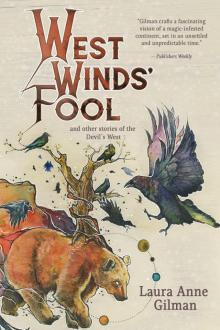 West Winds' Fool and Other Stories of the Devil's West
West Winds' Fool and Other Stories of the Devil's West Gabriel's Road
Gabriel's Road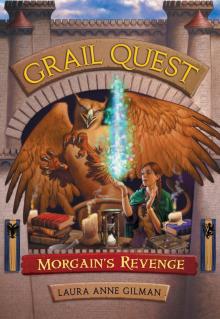 Morgain's Revenge
Morgain's Revenge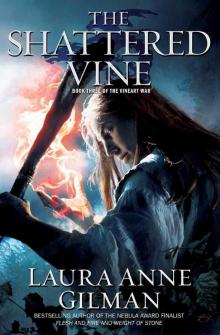 The Shattered Vine
The Shattered Vine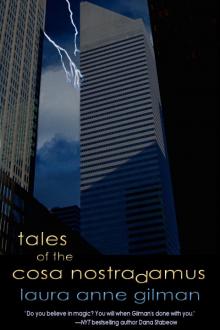 Laura Anne Gilman - Tales of the Cosa Nostradamus
Laura Anne Gilman - Tales of the Cosa Nostradamus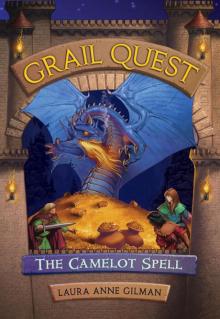 The Camelot Spell
The Camelot Spell VISITORS
VISITORS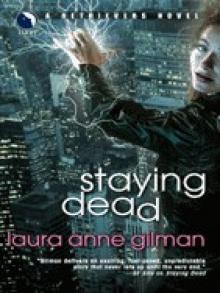 Staying Dead
Staying Dead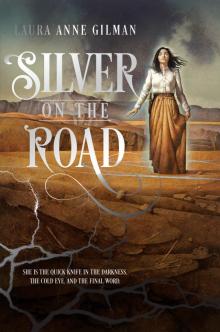 Silver on the Road
Silver on the Road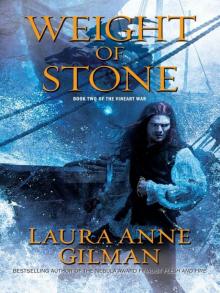 Weight of Stone
Weight of Stone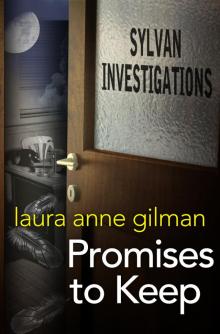 Promises to Keep
Promises to Keep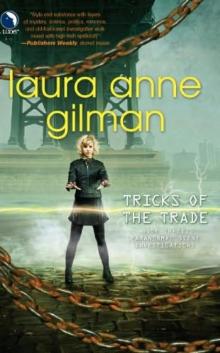 Tricks of the Trade psi-3
Tricks of the Trade psi-3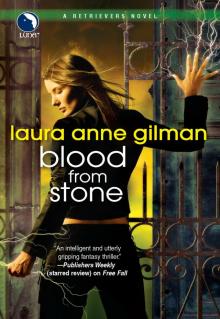 Blood from Stone
Blood from Stone Soul of Fire tp-2
Soul of Fire tp-2![Pack of Lies [2] Read online](http://i1.bookreadfree.com/i1/04/01/pack_of_lies_2_preview.jpg) Pack of Lies [2]
Pack of Lies [2] Burning Bridges
Burning Bridges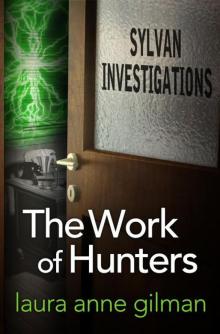 The Work of Hunters
The Work of Hunters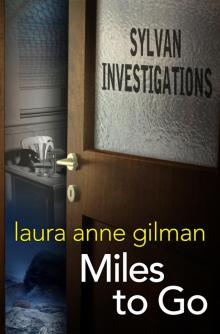 Miles to Go
Miles to Go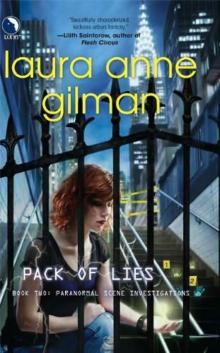 Pack of Lies psi-2
Pack of Lies psi-2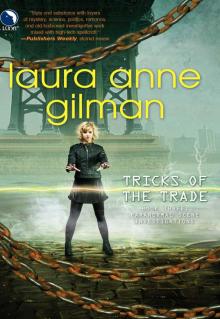 Tricks of the Trade
Tricks of the Trade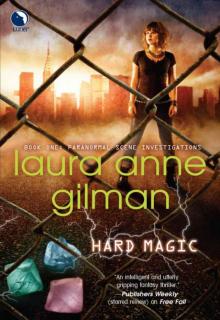 Hard Magic
Hard Magic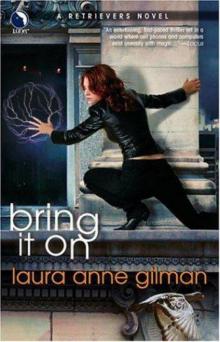 Bring It On
Bring It On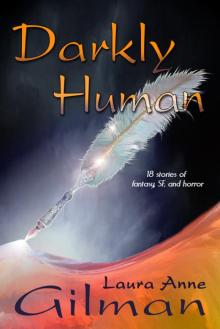 Darkly Human
Darkly Human The Cold Eye
The Cold Eye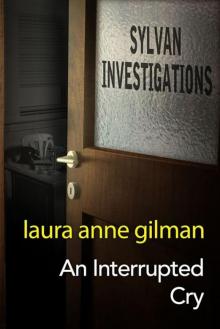 An Interrupted Cry
An Interrupted Cry Soul of Fire
Soul of Fire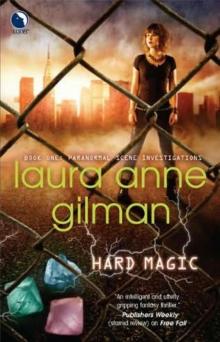 Hard Magic psi-1
Hard Magic psi-1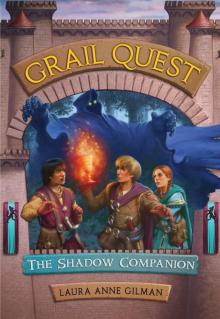 The Shadow Companion
The Shadow Companion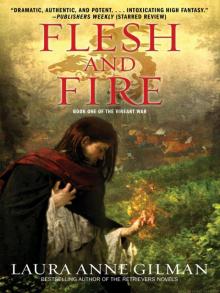 Flesh and Fire
Flesh and Fire